Empowering Choices: The Essentials of Birth Control Counseling
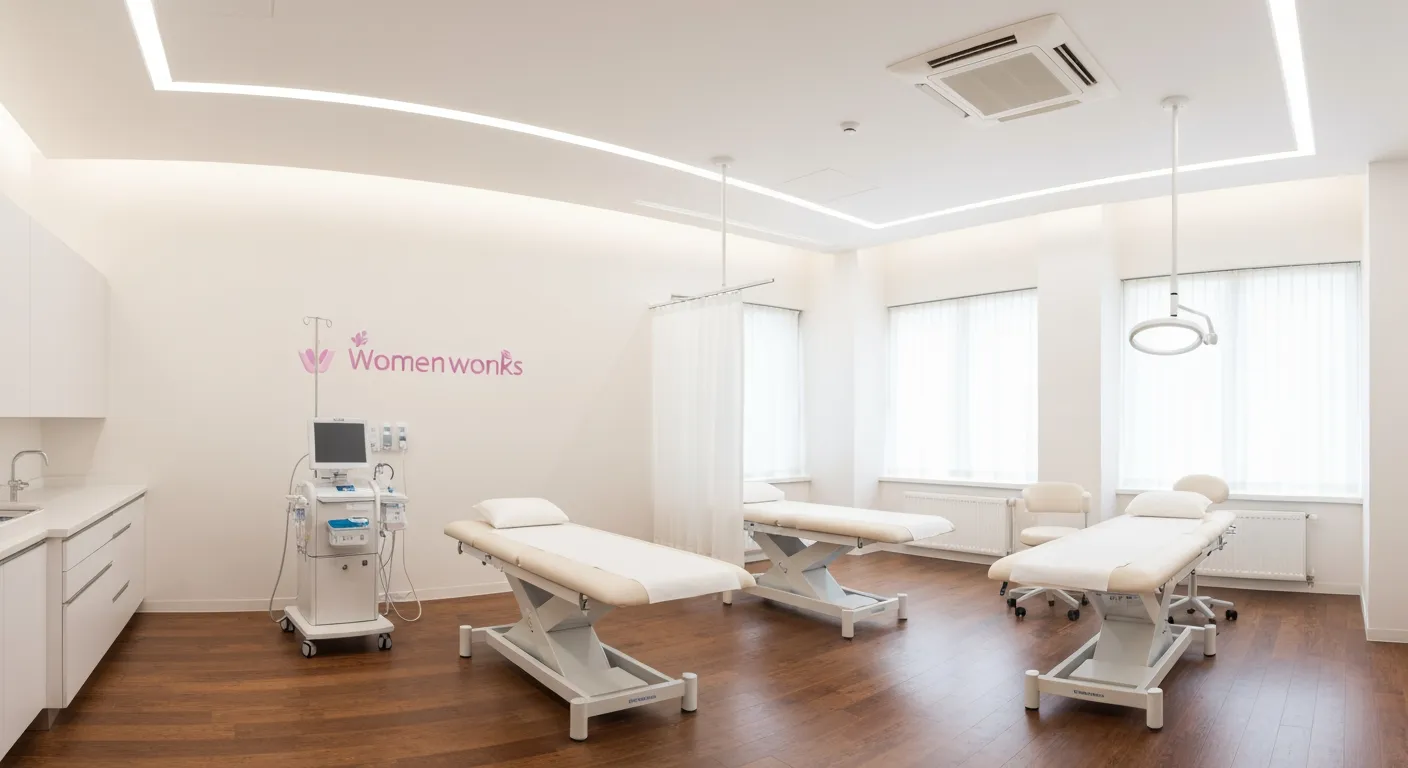
The Importance of Age-Specific Screenings
Women's health evolves across their lifespans, influenced by changing biological, lifestyle, and risk factors. Age-specific health screenings are vital tools for early detection and prevention of disease, improving outcomes and quality of life. This guide provides a comprehensive overview of recommended screenings for women at various life stages, emphasizing personalized care and evidence-based guidelines to empower women in maintaining optimal health.
Preventive Health Screenings for Women Ages 18 to 39

What health screenings are recommended for women aged 18 to 39?
Women between the ages of 18 and 39 should maintain regular health checkups even when feeling healthy. Blood pressure screenings are generally recommended every 3 to 5 years, but those with risk factors such as diabetes, heart disease, or family history may need more frequent monitoring.
Cervical cancer screening begins at age 21 with Pap tests every 3 years for women aged 21 to 29. For women aged 30 to 39, screening options include Pap tests every 3 years, HPV testing every 5 years, or a combination of both (cotesting) every 5 years.
Cholesterol screening typically starts at age 45 for women without risk factors but should begin earlier, from age 20, if risk factors exist (Cholesterol screening guidelines). Screening for prediabetes and type 2 diabetes starts at age 35, especially for those who are overweight or have other risk factors (Prediabetes and diabetes screening).
Vaccinations play a critical role in preventive care. Women should receive annual influenza vaccines, COVID-19 vaccines as recommended, and Tdap boosters every 10 years. Completion of HPV vaccination (ideally begun in adolescence), as well as varicella, hepatitis B, and MMR vaccines, is also advised based on individual immunity status.
Sexually transmitted infection (STI) screening is particularly important. Sexually active women up to age 25 should be screened annually for chlamydia and gonorrhea. Women older than 25 with high risk factors should be tested as appropriate.
Eye exams are recommended every 5 to 10 years before age 40, with increased frequency for those experiencing vision issues or managing diabetes. Dental exams should occur one to two times annually for oral health maintenance.
Lifestyle counseling is an essential part of care, covering healthy diet, physical activity, alcohol and tobacco use, and mental health assessments to identify anxiety, depression, or other concerns early.
Regular visits provide an opportunity to discuss and manage risk factors while promoting healthy habits that enhance long-term wellbeing.
Health Screenings for Women Ages 40 to 64
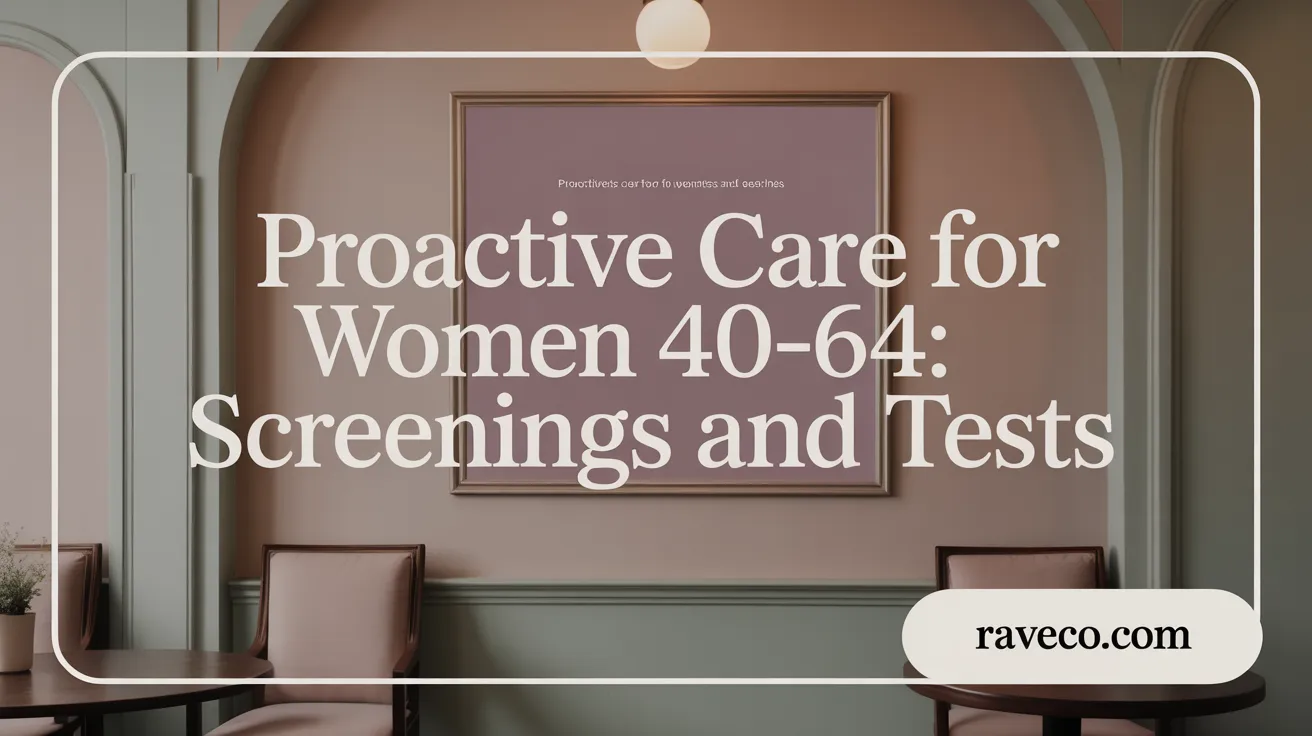
What screenings should women aged 40 to 64 undergo?
Women aged 40 to 64 should engage in regular health screenings to ensure early detection of common conditions. Annual blood pressure checks for women are recommended to monitor for hypertension.
Breast cancer screening is advised with mammograms every 1 to 2 years starting at age 40. For cervical cancer, Pap tests every 3 years or HPV testing every 5 years are recommended for women aged 30 to 65.
Cholesterol screening guidelines typically begin at age 45 for women without risk factors but start earlier if risks exist, with follow-up tests every 5 years or as needed.
From ages 45 to 75, colorectal cancer screening recommendations are recommended using stool-based tests annually or a colonoscopy every 10 years depending on risk and preference.
Women should have dental exams for women once or twice a year and eye exam schedule for women 40-64 every 2 to 4 years for ages 40 to 54, then every 1 to 3 years for ages 55 to 64.
Vaccinations are a crucial part of preventive care and include annual flu vaccine recommendations, COVID-19 vaccines, pneumococcal vaccine advice including Tdap boosters every 10 years, varicella and hepatitis B vaccines as needed, and shingles vaccine guidelines starting at age 50.
Screening for Hepatitis C screening for adults 18-79, and routine HIV screening for women aged 15 to 65 is advised.
For women aged 50 to 80 with a history of heavy smoking, annual lung cancer screening using low-dose CT is recommended.
Osteoporosis screening should be considered for women in this age group who have risk factors such as steroid use or low body weight (osteoporosis screening considerations).
Skin cancer risk and screenings may be performed for those at higher risk due to personal or family history.
Comprehensive annual routine physical exams should monitor blood pressure, height, weight, BMI, mental health, lifestyle factors, medication use, and safety.
These screenings support proactive health management during midlife and help prevent and detect chronic conditions early.
Health Screenings for Women Age 65 and Older
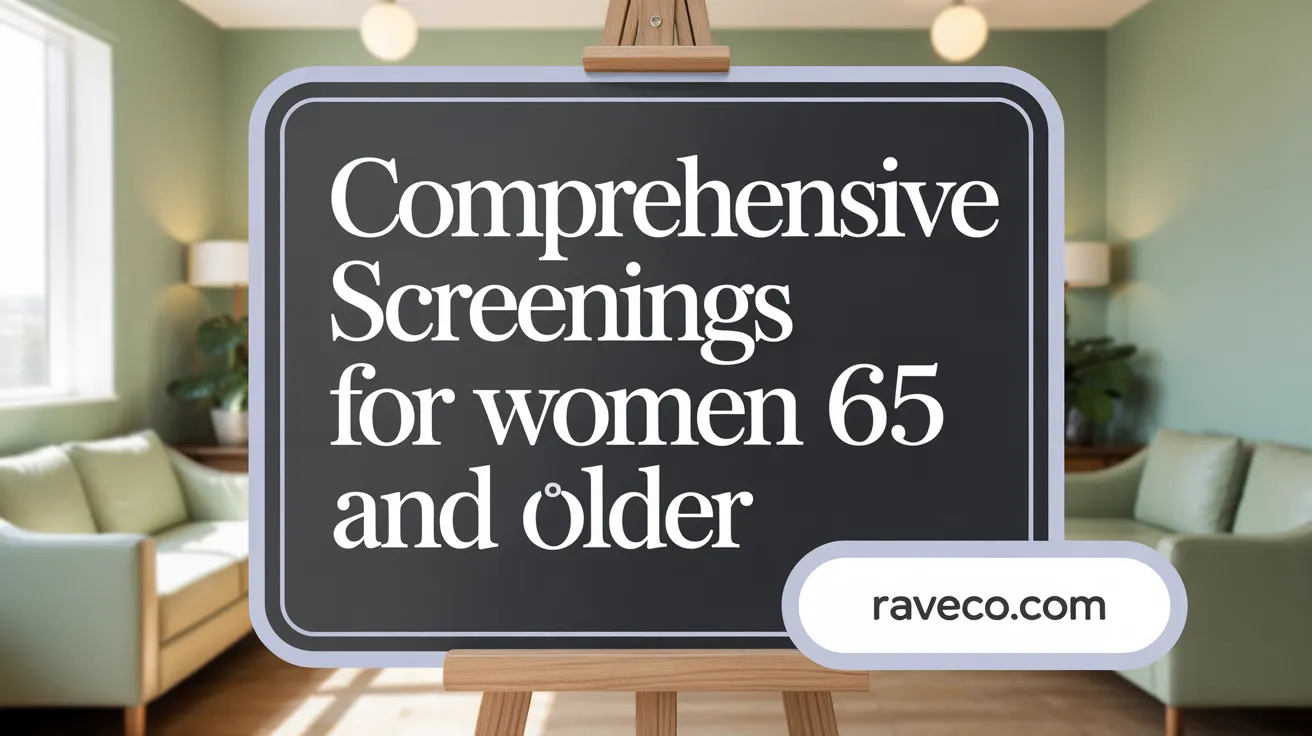
What health screenings are suggested for women aged 65 and older?
Regular health checkups are vital for women aged 65 and older, even if they feel healthy. Blood pressure should be checked at least once a year, with more frequent monitoring for those with existing health conditions or risk factors (Health screenings for women 65 and older, Annual blood pressure check.
Breast cancer screening with mammograms is recommended every 1 to 2 years for women up to age 75. Beyond this age, the decision to continue screening should be personalized, considering overall health and life expectancy (Mammograms for women up to 75, Breast cancer screening guidelines, Biennial mammography screening).
Cervical cancer screening typically can be stopped if a woman has had at least 10 years of negative results and no history of cervical cancer or precancerous lesions (Cervical cancer screening guidelines, Pap tests and pelvic exams screening.
Cholesterol testing should be repeated every 5 years if previous results are within normal ranges (Cholesterol screening recommendations, Cholesterol screening schedule. Screening for diabetes is advised every 3 years or more frequently depending on individual risk factors (Diabetes screening every 3 years, Prediabetes and type 2 diabetes screening.
Colorectal cancer screening continues until age 75, using methods such as colonoscopy, fecal occult blood testing, or sigmoidoscopy, based on patient preference and medical advice (Colorectal cancer screening recommendations, Cancer screening guidelines by age).
Vision exams are recommended every 1 to 2 years, with hearing tests advised if symptoms of hearing loss appear (Eye exams and hearing tests, Vision screening recommendations.
Dental care remains important, with teeth and gum exams recommended one to two times annually (Dental exams for older women, Dental health screenings.
Immunizations are essential and include annual influenza vaccines, COVID-19 vaccinations, pneumococcal vaccines, and shingles vaccine starting at age 50 (Recommended vaccines for older women, Immunizations for women).
Lung cancer screening with low-dose CT scans is advised for women aged 50 to 80 who have at least a 20 pack-year smoking history and currently smoke or quit within the past 15 years (Lung cancer screening guidelines, Lung cancer screening overview).
Osteoporosis screening by bone density (DEXA) scan is recommended for all women aged 65 and older, and for younger women with risk factors such as previous fractures, steroid use, or family history (Osteoporosis screening recommendations, Bone density testing recommendations.
Skin cancer screenings should be considered for women with high risk, including those with a personal or family history of skin cancer (Skin cancer risk and exams, Skin cancer screening. Routine physical exams also include assessments of mental health, lifestyle factors, and medication reviews (Routine physical exams, Mental health assessments.
These preventive screenings play a crucial role in early detection and maintaining health during older adulthood (Health screenings for women 65 and older, Preventive health screenings by age).
Cancer Screening Guidelines Across Lifespan
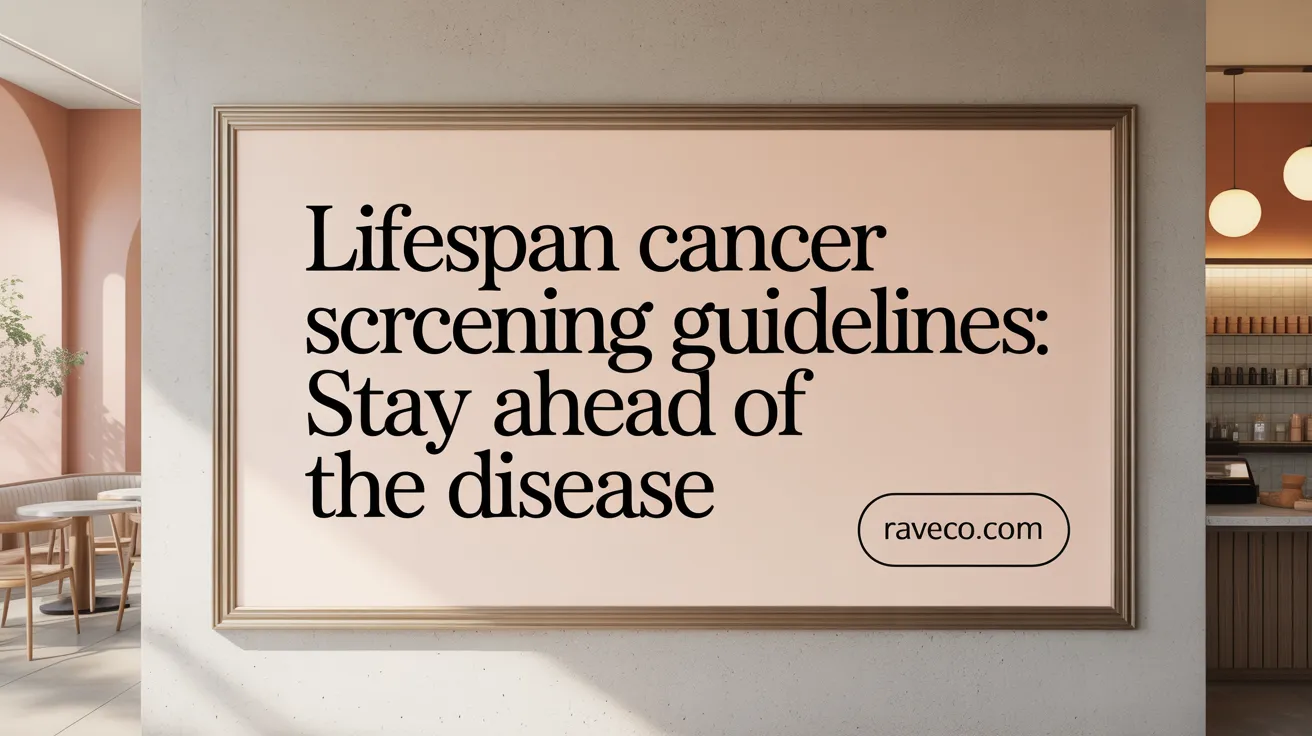
What are the cancer screening recommendations for women across different age groups?
Breast cancer screening is advised for women starting at age 40, with mammograms recommended every 1 to 2 years through at least age 74 for those at average risk. Women with a family history of breast cancer or other risk factors may need personalized screening plans including additional imaging like MRI (Breast cancer screening.
Cervical cancer screening begins at age 21 with Pap tests every 3 years. For women aged 30 to 65, options include continued Pap testing every 3 years, HPV testing every 5 years, or co-testing (Pap plus HPV) every 5 years. Screening typically stops after age 65 if prior tests were normal (Cervical cancer screening.
Colorectal cancer screening should start at age 45 and continue until age 75. Screening methods are flexible, including annual stool-based tests and colonoscopy every 10 years. Screening frequency may be adjusted based on personal risk factors (Colorectal cancer screening.
Lung cancer screening with low-dose computed tomography (CT) is recommended annually for women aged 50 to 80 who have a 20 pack-year or greater smoking history and currently smoke or quit within the past 15 years (Lung cancer screening.
Skin cancer screening is advised for women with higher risk factors such as a personal or family history of skin cancer. Regular skin checks by a provider or self-exams help with early detection (Skin cancer risk and screenings.
Women with a family history of breast or ovarian cancer should consider genetic counseling to assess inherited risks and tailor their screening and prevention strategies accordingly (Genetic counseling for breast cancer risk).
Lifestyle factors play a critical role in cancer risk reduction. Avoiding tobacco, maintaining a healthy body weight, staying physically active, eating a balanced diet, and limiting alcohol intake all contribute to lowering the risk of developing cancer (Healthy lifestyle and cancer risk.
Age-specific protocols include beginning screenings at recommended ages and intervals, with adjustments based on individual risk. Older women should discuss with their healthcare provider whether to continue or stop screening based on overall health and life expectancy (Age-specific cancer screening recommendations.
Reproductive and Sexual Health Screenings
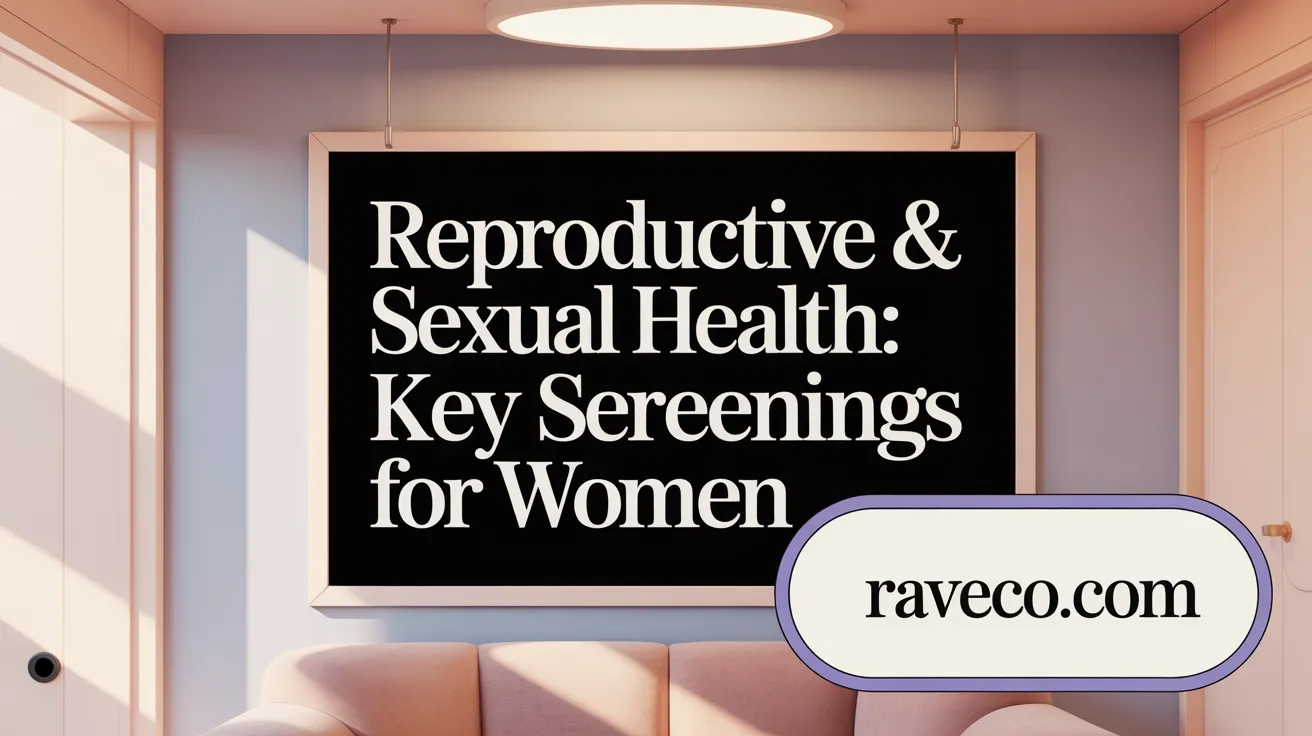
What are the key reproductive and sexual health screenings for women?
Reproductive and sexual health screenings are essential for early detection and prevention of various health issues in women. Cervical cancer screening begins at age 21 with Pap tests every 3 years for women aged 21 to 29. For women aged 30 to 65, screening options include Pap tests every 3 years, HPV testing every 5 years, or cotesting (Pap plus HPV testing) every 5 years, enabling tailored approaches based on individual risk and prior results.
Sexually transmitted infection (STI) screening is recommended annually for sexually active women under 25 years old, focusing particularly on chlamydia and gonorrhea. Women older than 25 should be screened based on risk factors such as new or multiple partners. This screening helps prevent complications such as pelvic inflammatory disease and infertility.
Regular counseling on contraception and family planning is advised to support women in making informed choices tailored to their reproductive goals. This includes discussing birth control options and reproductive life planning during well-woman visits.
Screening for intimate partner violence (IPV) and domestic violence is recommended annually for all adolescent and adult women, including those who are pregnant and postpartum. This screening is crucial for identifying women at risk and providing appropriate support and interventions.
Preconception and pregnancy-related screenings play a vital role in maternal and fetal health. These include screening for gestational diabetes typically after 24 weeks of pregnancy, hepatitis B and C virus testing, HIV testing, and ensuring vaccines such as Tdap and influenza are up to date. Early detection of these conditions allows for timely management to reduce adverse outcomes.
Postpartum care includes breastfeeding support and counseling, as well as screenings such as postpartum screening for type 2 diabetes in women who had gestational diabetes. Ongoing support during this period helps optimize maternal and infant health.
Together, these reproductive and sexual health screenings and counseling services promote comprehensive care, enabling women to maintain optimal health throughout their reproductive years and beyond.
Immunizations: Keeping Women Protected Through Life
What immunizations are recommended for women and at what ages?
Immunizations play a vital role in maintaining women's health throughout their lives. Women are advised to receive an annual influenza vaccine to guard against the flu every year. COVID-19 vaccination is also recommended, with specific timing and boosters guided by individual risk factors and current health guidelines.
Tdap boosters, protecting against tetanus, diphtheria, and pertussis, are recommended every 10 years and during each pregnancy to protect both mother and newborn. HPV vaccination is routinely administered at ages 11 to 12, with catch-up doses available for some adults up to age 26 to prevent HPV-related cancers.
Starting at age 50, women are encouraged to get the shingles vaccine to reduce the risk of herpes zoster. Varicella (chickenpox) and hepatitis B vaccines should be given to those without prior immunity or infection, ensuring protection against these diseases.
For women aged 65 and older, pneumococcal vaccines are important to prevent pneumonia, particularly for those with underlying health conditions. Pregnant women between 32 and 36 weeks gestation are recommended to receive the RSV vaccine, which helps protect their infants after birth.
Vaccine schedules are carefully personalized by healthcare providers based on a woman's age, health status, vaccination history, and potential exposure risks, ensuring optimal protection across the lifespan.
Mental Health and Lifestyle Assessment in Women’s Preventive Care
How are mental health and lifestyle factors integrated into women's preventive screenings?
Routine preventive visits for women consistently incorporate mental health screening to monitor conditions such as anxiety and depression. Screening for anxiety disorders occurs across adolescent and adult age groups, ensuring early identification and timely intervention. Substance use, including tobacco and alcohol consumption, is regularly evaluated, with healthcare providers offering counseling and pharmacotherapy referrals when needed.
Obesity and weight management receive focused attention through discussions on diet, exercise, and lifestyle habits aimed at reducing risk factors for chronic diseases as part of obesity screening recommendations. Providers conduct annual screenings for intimate partner violence and domestic violence, recognizing the importance of assessing patient safety as part of comprehensive care.
These elements are integrated within well-woman visits, where healthcare providers engage in individualized, patient-centered care. This approach allows tailoring interventions, encouraging shared decision-making in healthcare, and promoting holistic health improvements. By embedding mental and behavioral health screenings into preventive care frameworks, the overall wellbeing and health outcomes for women are enhanced effectively.
The Role of Regular Physical Exams and Screening Customization
Why are regular physical exams important and how is screening customized for women?
Regular physical exams play a crucial role throughout a woman's lifespan by providing opportunities to monitor vital signs such as blood pressure, height, weight, and BMI. These routine checkups are essential not only for detecting existing conditions like hypertension or high cholesterol but also for updating family history and assessing personal risk factors that may influence future health.
Through these visits, healthcare providers can tailor screening schedules to fit individual needs and risks. For example, a woman with a family history of breast cancer may begin mammograms earlier or have additional screenings. Personalized recommendations help ensure timely prevention and early detection.
Shared decision-making in healthcare between providers and patients enhances communication and encourages healthy lifestyle choices. This collaborative approach builds trust, particularly in a woman-led healthcare environment, fostering a supportive space where women feel heard and cared for.
Ultimately, regular exams and customized screening empower women to maintain optimal health, adapting prevention and treatment strategies as their health needs evolve. For more information on comprehensive preventive care, see the Well-Woman Chart.
Empowering Women Through Lifelong Screening and Personalized Care
Age-appropriate health screenings and preventive services are critical components of women's healthcare, enabling early detection and management of health issues, reducing disease risk, and promoting wellness. Tailoring screenings to a woman's unique risk profile and life stage, combined with regular provider visits and healthy lifestyle support, optimizes outcomes and quality of life. Ongoing advancements in evidence-based guidelines and equitable access, particularly in woman-led care settings, empower women to take charge of their health throughout their lifespans. Staying informed and engaged with one's healthcare provider is essential for navigating preventive care successfully.



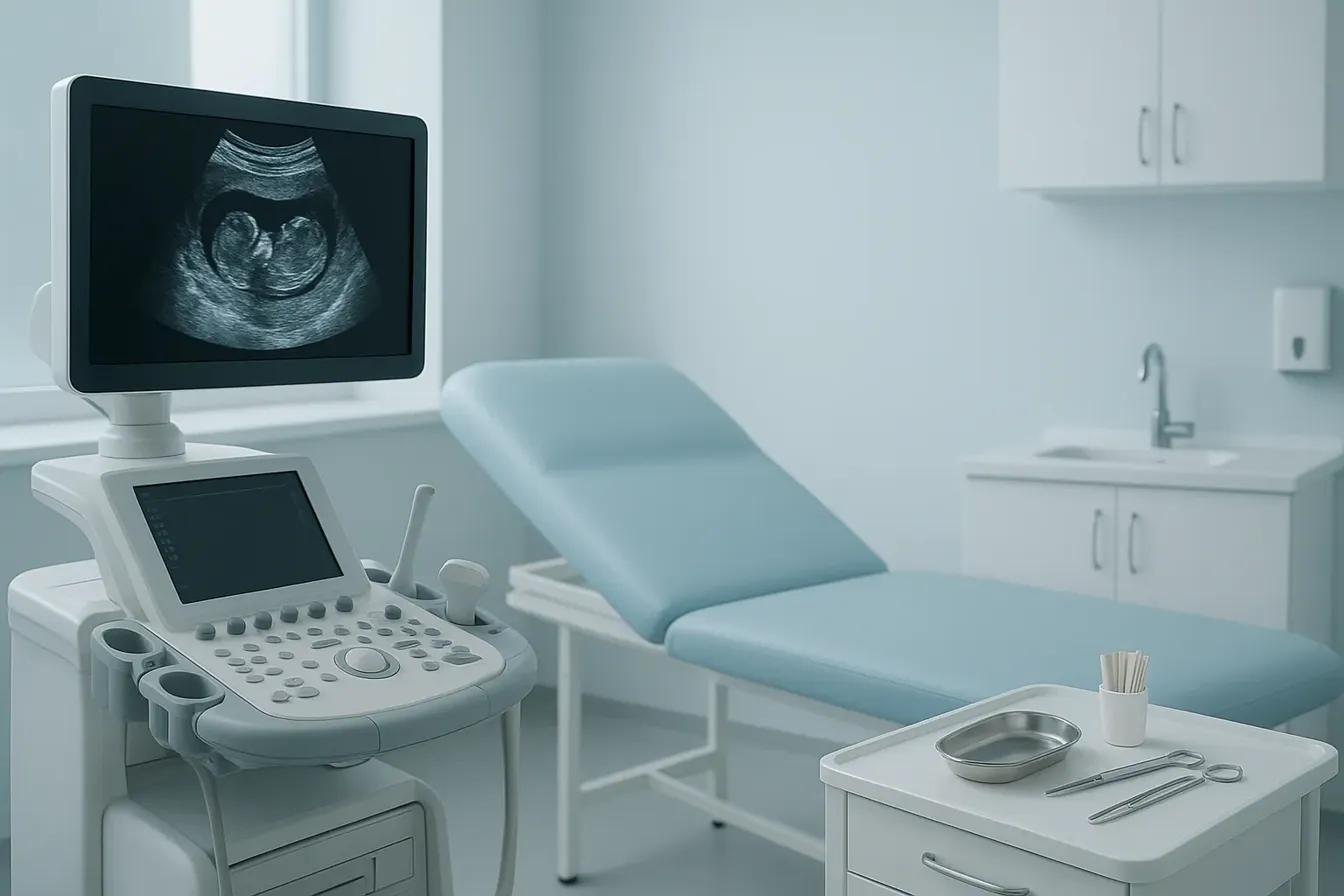
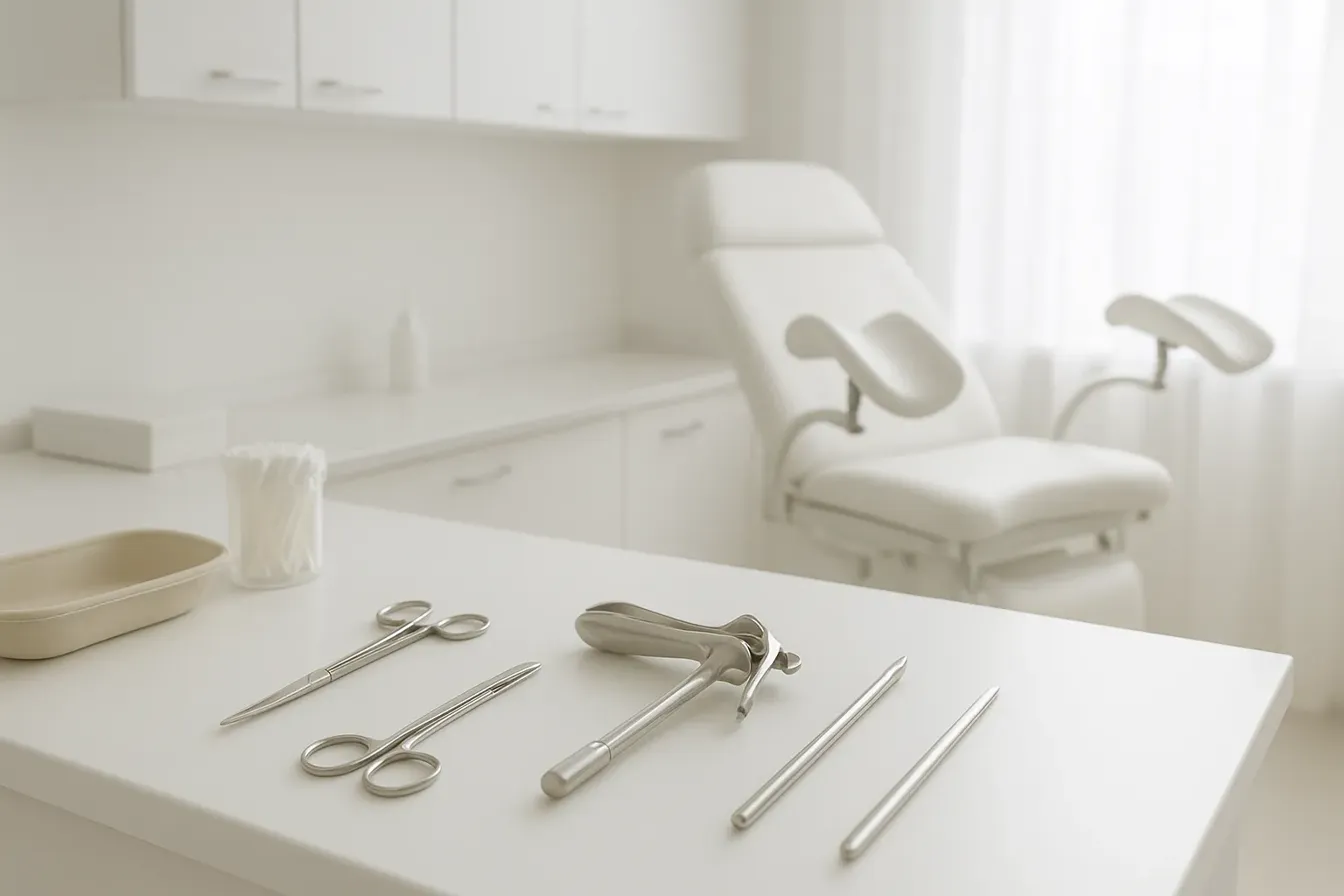
.png)